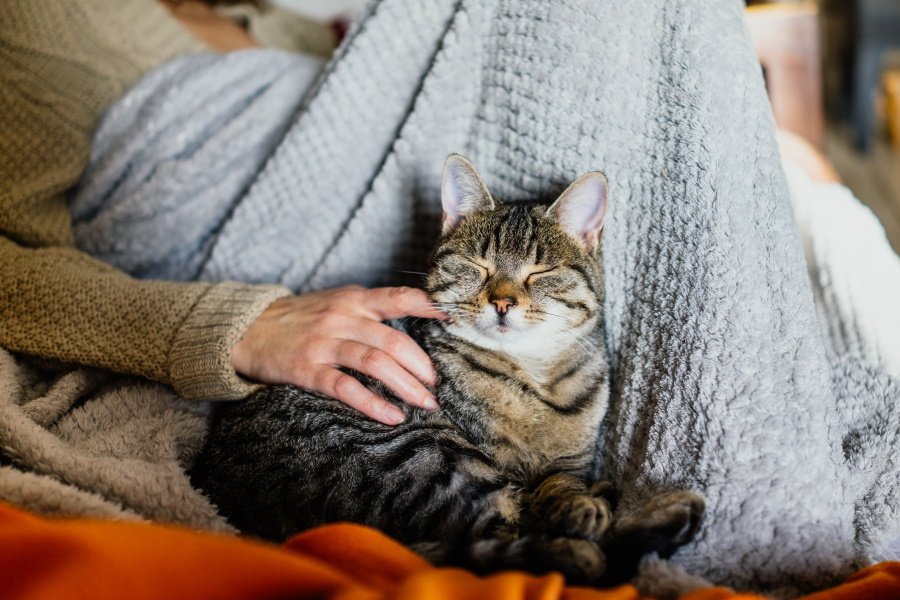When you first set eyes on that sweet fluffy face of your future fur baby, you couldn’t be more excited to bring the feline home. You have never had a house cat before, but think they are cute, cuddly, and fairly low maintenance – win-win for everyone.
Wrong! Cat’s can’t be trained as well as dogs. They are persnickety, to say the least, have very strict bathroom needs, and will scratch furniture to shreds if you aren’t properly prepared for them. So do yourself a favor and make sure to get your home and mind ready for welcoming your new house cat.
With a couple of little home tweaks and some things for your house cat, you will both not only live together happily but bond to a loving relationship for the years to come.
Table of Contents
Hiding Spots for Your Cat
Just like a small child sometimes has a security blanket, or you have those comfy pants or favorite chair you love – a cubby for a cat is necessary. A cubby is normally either in a cat tower, a carrier (yes, they can sleep in them,) or cat cave or cat house to allow your cat a special hideaway.
Normally they should have blankets to curl up in or other materials, or just by virtue of its construction, they can hide. Cubbies provide a place that your house cat can feel safe, secure, and hide away from environmental and other stressors.
Now, you have to consider your feline’s size before selecting the right cubby. This isn’t a one-size-fits-all, and you might have to change it up down the road. Be sure there is enough space for the cat, blankets, or soft surface items but not so big that the sense of security and privacy is missing. Having this space ready for your cat from day one can immediately provide a sense of wellbeing in their new environment and set the tone for your give and take relationship moving forward.
Looking After Your Cats Claws
Just like human nails that require regular maintenance, cats have claws. Oh, yeah, and if you aren’t prepared for this, you will learn the hard way normally with the loss of furniture, floorboards, or other such things around the house.
You must get scratching posts, ropes, or other objects that will be useful for your feline’s grooming needs. Many cats can naturally take care of their nails without human intervention if they have appropriate items to scratch on. Feline parents may decide to groom to help facilitate the cat’s needs and if you are one such person, be sure you introduce this into their routine as soon as possible. If you have a full-grown cat that you adopt and has never been groomed, be ready for you or the groomer to wear some scars.
Additionally, you might hear about de-clawing as you start researching to deal with your cat’s claws. Please do your research thoroughly before resorting to this step. Many vets will no longer declaw cats unless in very specific circumstances, and in some jurisdictions, it’s illegal.
We recommend you leave your cat’s claws intact and just make sure they have appropriate places to scratch. It’s best to have a few scratching posts or pads around the house. Ideally, place a few cat towers or scratching pads close to where your house cat sleeps. Often, cats will wake up, groom their claws and then set off on their next adventure.
Keeping Your Cat Entertained
Cat’s are curious souls that must be entertained. Keep bird feeders outside the window, and install a hammock for them to sit and watch out of. Or make sure they have plenty of toys around and switch them up. Small soft mice, balls and other cat toys will keep your cat entertained.
Cats LOVE catnip. Some owners grow their catnip plants which are great for cats to eat, but they also enjoy swatting at the leaves and hiding around these and other plants. Whatever you decide works for your home, cat, and needs – be prepared. A bored cat will become a naughty cat and start finding things to get into, and then you are at their mercy.
Another way to keep your house cat entertained and engaged is to place a cat hammock or window perch. This will allow your kitty to look out the window and enjoy the sights of the outdoors. Birds, cars and squirrels can help to keep your cat happy and entertained, especially if you are away from your home for long periods of time.
Litter Box Tips
Cat’s don’t like dirty, messy bathroom spaces. Just be prepared with litter and a routine to get them using a box right from the first moment they are in your home. Cat’s will require you have a plan to maintain their bathroom space fastidiously.
Cats don’t like dirty, overly fragrant litter boxes, and you will find out real fast if they are unhappy with the accommodations as they start peeing in places other than their designated litter box. Take action immediately to figure out the problem and resolve it, as they will start leaving more messes for you in places you don’t like.
With a little bit of planning, you and your new adorable kitty will be happy, loving companions for years to come. Be sure you have a plan for litter and its maintenance, along with toys to keep your feline entertained. Ensure they have their own cubby space to manage stress, anxiety, and their own mental wellbeing in their own private area. Finally, remember that cats need interaction, and each will have its likes and dislikes.
Make sure to give your cat the attention it needs by playing, petting and talking to your cat. Have a plan, but be willing to be flexible as you discover what your cat likes and dislikes.
Cats are not passive creatures. If they are unhappy – you will know. Listen, react and help eliminate stressors for both of you. As the saying goes, happy cat, happy life!

Jonathon Hyjek is an entrepreneur and cat-lover. He is married to Joy and they share their home with their 2 feline-friends, Franklin & Ollie. Jonathon is a self-admitted “Crazy Cat Guy”. He started this website because of his love for his own cats and their well-being.

